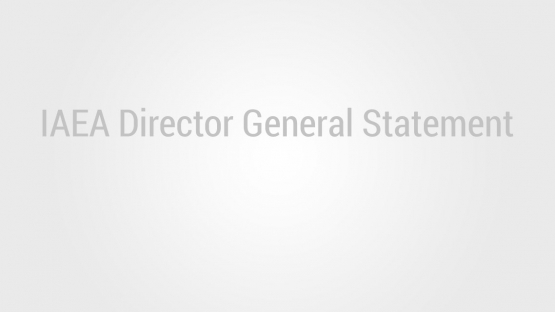The International Atomic Energy Agency (IAEA) extends its deepest sympathy to all those who lost loved ones in the terrorist attacks in the United States of America on 11 September 2001. It is sobering to recognize that had the terrorists used nuclear or other radioactive materials in the perpetration of their attacks, the effects might have been even more horrendous. The IAEA has long been active in encouraging States to make security an integral part of the management of their nuclear programmes. The attacks in September 2001 were, however, a wake-up call to the world nuclear community that more can and must be done.
The willingness of terrorists to sacrifice their lives to achieve their evil aims creates a new dimension in the fight against terrorism. The concern is not just dealing with the possibility of governments diverting nuclear materials into clandestine weapon programmes. The attacks of 11 September alerted the world to the potential of terrorists targeting nuclear facilities or using radioactive sources to incite panic, contaminate property, and even cause injury or death among civilian populations.
In the wake of the terrorist attacks, Member States of the IAEA meeting in the Agency's General Conference adopted a resolution requesting that the IAEA Director General initiate a thorough review of the Agency's activities and programmes relevant to preventing acts of terrorism involving nuclear and other radioactive materials. The Agency moved rapidly to respond. It devised and is presently implementing an integrated action plan which includes enhanced and new activities to upgrade nuclear security worldwide and to combat nuclear terrorism. The plan covers eight areas: (1) physical protection of nuclear material and nuclear facilities; (2) detection of malicious activities (such as illicit trafficking) involving nuclear and other radioactive materials; (3) strengthening of State systems for nuclear material accountancy and control; (4) security of radioactive sources; (5) the assessment of safety and security related vulnerabilities at nuclear facilities; (6) response to malicious acts or threats thereof; (7) the adherence to international agreements and guidelines; and (8) co-ordination and information management for nuclear security related matters.
National measures for protecting nuclear material and facilities remain uneven in their substance and application. There is wide recognition that the international physical protection regime needs to be further strengthened. Through its International Physical Protection Advisory Service (IPPAS), the Agency provides Member States with assessment services, together with associated advice and follow up actions to improve security arrangements at nuclear facilities. It also provides training and workshops, notably in assessing threats, as well as other supporting services, including the development of standards, guidelines and recommendations.
An important step against possible terrorist activities involving nuclear material is to ensure that all nuclear material in a State is properly accounted for at all times. An effective State System for Accounting and Control (SSAC) can deter terrorist activities and provide for their early detection. The Agency is providing assessment services to Member States, for example with respect to equipment upgrades and training of SSAC personnel. Regarding the potential risk of radioactive materials being used by terrorist groups to build a radiation dispersal device (also known as a "dirty bomb"), it is a matter of high concern that such materials can be found in almost any country in the world. More than 100 countries may have control and monitoring programmes inadequate to prevent or even detect the theft of these materials. However, while radioactive sources number in the millions, only a small percentage have enough strength to cause serious radiological harm. These powerful sources are the priority. In this regard, I continue to emphasize that what is needed is cradle-to-grave control of powerful radioactive sources to protect them against terrorism or theft. One of the Agency's priorities is to assist States in creating and strengthening national regulatory infrastructures to ensure that these radioactive sources are appropriately regulated and adequately secured at all times. Consequently, the Agency has provided support to several States in connection with incidents involving unsecured radioactive sources, notably in Afghanistan, Argentina, Bolivia, Georgia and Uganda. Furthermore, the IAEA has organized regional workshops on the safety and security of radioactive sources.
Illicit trafficking is the consequence of the failure to protect and control nuclear and other radioactive material properly. The Agency provides training and other support to border monitoring agencies and maintains a data base on illicit trafficking incidents.
Terrorism is a global threat and the response to it must be global in nature. The effectiveness of anti-terrorist measures will be determined by the weakest link in the system. It must be recognized that there are gaps or vulnerabilities in the States' records of security of nuclear materials and facilities. They need to be addressed and certain measures need to be taken to enhance nuclear security. The world nuclear community has to make a serious commitment to provide the necessary funds to the IAEA to fully implement the activities identified and underway in the plan of action to combat nuclear terrorism.
Finally, I cannot over-emphasize that the activities being implemented under the Agency's plan of action are not a substitute for national measures, nor can they diminish the primary responsibility of the State on all matters of security; rather they are designed to supplement and reinforce national efforts in areas where international co-operation is indispensable to the strengthening of nuclear security. As radiation knows no frontiers, the world nuclear community needs to recognize that the safety and security of nuclear material and facilities located anywhere in the world is a legitimate concern of all States. The International Atomic Energy Agency stands ready to provide its assistance and expertise to enhance the security of civilian nuclear materials and facilities worldwide.


